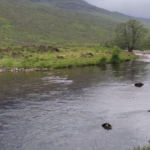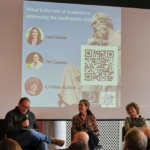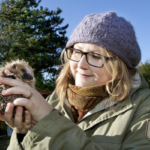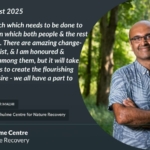Serious play for serious researchers

Heads are bent forward intently over tables and there is an air of concentration around the room as workshop participants attend to their assigned task, the only sound that satisfying “click” as the small plastic Lego bricks are pressed together.
This is the scene at the start of a Lego Serious Play workshop held on Monday 1st July, participants united by a common theme of being associated with The University of Oxford’s School of Geography and the Environment (SoGE) and interested in research in Oxfordshire.
Collaboration across The University of Oxford’s School of Geography and the Environment
Why was a group of university staff and students spending a morning playing with Lego? The idea for this workshop came when the School of Geography announced its Research Environment and Culture Fund, which supports small projects that contribute to excellence of research in SoGE and strengthen SoGE’s research environment and culture; promoting equality, diversity and inclusion is an important component (look out for their next funding opportunities in the SoGE Research Support newsletters). I’m relatively new to the department, and had been surprised, perhaps naively, at how many people I came across doing research in Oxfordshire who weren’t talking to each other. With potentially complementary research happening in overlapping geographical areas, I wanted to explore how we can try to make the whole more than the sum of the parts. This has benefits for the research itself, in developing novel interdisciplinary research programmes, as well as for local communities who deserve to have a co-ordinated, impact-driven approach to research, avoiding multiple research groups asking for their input with no tangible impact. (This aligns with aims of the newly formed Local Policy Lab, a county-wide initiative lead by Oxford Brookes, The University of Oxford and Oxfordshire County Council, which aims to promote relationships and bridge the gap between research and local policy in Oxfordshire). With this in mind, the aim of the workshop was to promote communication and collaboration between SoGE staff and students who are interested or active in research in Oxfordshire, leading to novel, interdisciplinary research collaborations. The workshop was planned with and promoted by representatives from across SoGE (Geography, ECI, SSEE, TSU), to increase collaboration across the units.
Lego Serious Play
The workshop was developed with a team of representatives from across SoGE, guided by games-based learning professional Sarah LeFevre, who facilitated the workshop. Lego Serious Play (LSP) is a methodology developed by Lego which in now available under an open-source model. Its aim is to improve creative thinking and communication and is widely known as a method that allows equality of voice amongst participants from diverse backgrounds; a central tenet of LSP is that “everybody builds, everybody listens”. LSP was therefore suitable for a workshop at which we wanted representation and input from professional services staff, senior and junior research staff and postgrad students.
The workshop
The workshop kicked off with introductions, followed by some initial training exercises lead by Sarah (e.g. “build a model with just green pieces of Lego that tells us about your day so far”).
Participants were then asked to build a model addressing the question:
“Thinking about your research, interests or concerns in Oxfordshire, what change(s) are you most eager to see?”.
After building, participants then had two minutes to explain their model to the rest of their table. Importantly, the models built in Lego Serious Play do not have to depict ideas literally – a single green brick, for example, could be used to represent a feeling of jealousy or calmness, a rare plant, an ill child, a house, or anything else that the builder says it is. Unsurprisingly, the individual models were colourful, creative and diverse in what they represented, with ideas ranging from urban areas with abundant accessible green infrastructure, to thoughts about collaboration between Danish universities and The University of Oxford.
After a tea break, which provided a good opportunity to chat with others in the room, the builders returned to their tables for the next stage of the workshop, answering the question:
“What connections or synergies exist between the individual models that could help the different visions become reality?”.
To do this, the individual models were placed on paper covering the tables, in whatever orientation the table wished, and the paper marked up to show relationships between the different models. The groups were given 15 minutes for this exercise, and then each table had 5 min to explain their model to the whole group. This exercise led to some complex, exciting ideas, which were largely about research methods and approaches, rather than descriptions of potential research projects.
The morning ended with half an hour for optional networking, giving participants the opportunity to talk with attendees who had not been on their table, speak to the facilitator about LSP methodology, continue discussions that had started on tables, or browse lists of upcoming funding opportunities.
What did we achieve?
The workshop was an opportunity for participants to step outside their daily routines, meet others interested in Oxfordshire research and experience LSP, a new methodology for collaboration. Transcriptions of audio recordings of the model descriptions have been used to produce summaries of the key themes emerging from each table’s final model landscape.
Informal feedback on the day showed that participants very much enjoyed the workshop and were interested in the LSP method. Feedback forms completed after the event show that participants found the workshop a useful opportunity for meeting other researchers who are active in Oxfordshire (mean = 4.5/5), would be likely to use the LSP methodology themselves in the future (mean = 4.5/5), were very satisfied with the workshop overall (mean = 4.75/5); participants were neutral or slightly positive that the workshop might lead to developing new research collaborations (3.5/5).
It was great to have the opportunity to bring together Oxfordshire researchers in SoGE; the organising team is working on key learnings from this workshop, the first of its kind in SoGE, and hope to find more opportunities and different ways of making it easier for SoGE researchers to collaborate, also bringing in the experience and interests of staff beyond researchers.
For those interested in the Lego Serious Play methodology, there are now kits available for workshops of up to 20 participants – please contact martha.crockatt@ouce.ox.ac.uk if you’d like to use them, or if you’re interested in finding ways to connect researchers working in Oxfordshire.
Other recent stories




